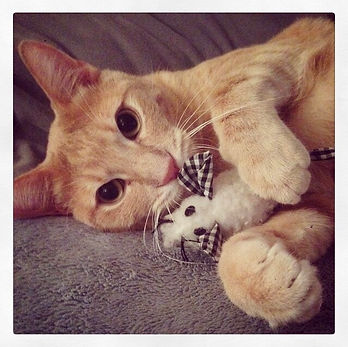Cat Behaviorist Raleigh Nc
Cats are marvelous creatures that can provide us with endless hours of entertainment and affection. However, it is important to understand that they also have their own unique set of behavioral patterns that we need to respect if we want them to be happy and healthy. That is why we want to share with you these 13 tips from a cat behaviorist that will help you maintain a positive relationship with your feline friend.
Cat Behaviorist #1 - Know Your Cat's Personality

Just like humans, cats have their own individual personalities. Some are outgoing and friendly, while others are more reserved and prefer to keep to themselves. Understanding your cat's personality can help you tailor your interactions with them to their specific needs, building trust and affection over time.
Cat Behaviorist #2 - Regular Vet Checkups

Cats are masters at hiding signs of illness, making it imperative to schedule regular vet checkups to ensure they are healthy. Your vet can also provide you with guidance on nutrition, behavior, and other factors that can affect your cat's well-being.
Cat Behaviorist #3 - Do Not Punish Your Cat

Punishing your cat when they display behaviors that you do not like, such as scratching or territorial marking, can create fear and distrust in your relationship. Instead, use positive reinforcement to encourage good behavior and provide your cat with appropriate scratching posts and litter boxes.
Cat Behaviorist #4 - Provide Adequate Stimuli

Cats are natural hunters and need adequate stimuli to keep them entertained and prevent boredom-related behaviors, such as chewing or scratching. Provide a variety of toys and activities, such as puzzle feeders and climbing towers, to keep your cat active and engaged.
Cat Behaviorist #5 - Provide Different Food Bowls

Some cats prefer to be fed in separate bowls, while others are comfortable sharing. Provide your cat with different feeding options to find what works best for them. Avoid free-feeding, as this can lead to obesity-related health issues. Instead, serve small, frequent meals throughout the day.
Cat Behaviorist #6 - Provide a Litter Box for Each Cat

Cats are territorial creatures and may not feel comfortable sharing a litter box with another cat. Provide a separate litter box for each cat in your household to prevent conflicts and promote healthy elimination habits.
Cat Behaviorist #7 - Provide Safe Hiding Places

Cats are solitary creatures and may need a safe place to retreat when they feel overwhelmed or stressed. Provide small, enclosed spaces, such as cardboard boxes or tunnels, to create a sense of security for your cat.
Cat Behaviorist #8 - Avoid Overstimulation

Cats can easily become overstimulated, leading to aggressive or anxious behaviors. Learn to read your cat's body language and provide them with quiet, restful spaces where they can relax and recharge.
Cat Behaviorist #9 - Use Cat-Friendly Toys

Cats are skilled hunters and love to play with toys that mimic prey. However, some toys, such as string or ribbon, can be dangerous if ingested. Choose cat-friendly toys, such as toy mice or balls, to keep your cat safe and entertained.
Cat Behaviorist #10 - Avoid Rough Play

Rough play, such as teasing or chasing your cat, can lead to defensive behaviors, such as biting or scratching. Use toys and positive reinforcement to play with your cat, respecting their boundaries and avoiding overexcitement.
Cat Behaviorist #11 - Provide Grooming Support

Cats are expert groomers but may need additional support, especially as they age. Regularly brush your cat's fur to remove loose hair and prevent matting. Trim their nails to prevent scratching and provide dental care, such as teeth brushing, to promote good oral health.
Cat Behaviorist #12 - Provide Elevated Spaces

Cats love to be in high places, as it provides them with a sense of security and control over their environment. Provide elevated spaces, such as cat trees or window perches, to satisfy your cat's natural curiosity and desire for exploration.
Cat Behaviorist #13 - Follow Your Cat's Lead

Above all else, remember that your cat is an individual with their own unique needs and preferences. Follow their lead, providing support and care that is tailored to their specific personality and behaviors. By doing so, you will develop a strong, positive relationship with your feline friend that will last a lifetime.
In conclusion, cats are wonderful creatures that bring joy and love into our lives. By following these 13 tips from a cat behaviorist, you can create a safe and healthy environment for your cat, promoting positive behavior and building a trusting relationship. Remember to always respect your cat's individuality and provide them with the care and attention they deserve.If you are looking for Cat behaviorist heading to Oregon after attack - The Dispatch you've came to the right web. We have 7 Images about Cat behaviorist heading to Oregon after attack - The Dispatch like Cat behaviorist heading to Oregon after attack - The Dispatch, How to Find a Cat Behaviorist Near You - Kitty Loaf and also Services – Feline Behavior Solutions - Cat Behaviorist. Read more:
Cat Behaviorist Heading To Oregon After Attack - The Dispatch
 cdispatch.com
cdispatch.com behaviorist manning
13 Tips From A Cat Behaviorist - Care.com
 www.care.com
www.care.com cat behaviorist
Services – Feline Behavior Solutions - Cat Behaviorist
cat behavior consultations services behaviorist packages package premium price
Salary Of A Cat Behaviorist | Bizfluent
 bizfluent.com
bizfluent.com salary behaviorist cat getty comstock thinkstock
Cat Behaviorist, Cat Training | Los Angeles | The Cat Counselor
 www.thecatcounselor.com
www.thecatcounselor.com counselor rates
How To Find A Cat Behaviorist Near You - Kitty Loaf
 www.kittyloaf.com
www.kittyloaf.com behaviorist cat near find
Cat Behaviorist, Cat Training | Los Angeles | The Cat Counselor
 www.thecatcounselor.com
www.thecatcounselor.com counselor
Counselor rates. How to find a cat behaviorist near you. Services – feline behavior solutions
Post a Comment for "Cat Behaviorist Raleigh Nc"